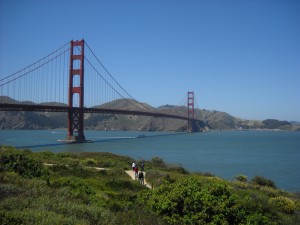
The Golden Gate Bridge turns 75 this weekend.

The Oakland Bay Bridge is the other San Francisco Bridge.
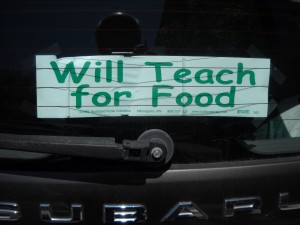
Tough times in the land of endless opportunities.
Barroom brawls used to be an integral part of the cinematic formula for a Western movie, but the one and only time the World’s Laziest Journalist witnessed a real life mêlée in a tavern occurred just about fifty years ago. The long dormant memories were quickly revived this past week during an effort to assess the trend spotting potential for connecting several business news stories from the San Francisco Bay area.
The Golden State Warriors (née Philadelphia Warriors) announced that since they have gotten a sweetheart real estate deal in Frisco, it was time to say adios to Oakland. It seems that the team owners will be gifted with some prime property on the waterfront and will provide their own funding for the construction of a new sports stadium entertainment complex in the postcard perfect setting.
The dramatic business news development occurred in “sucker punch” quick fashion this week. On Monday, the sports reporters were saying that something was developing. On Tuesday, a press conference on a pier on the bayside of fog city was being held.
The Sacramento Kings are scrambling to get a development deal from their hometown. In Los Angeles, efforts to get the L. A. City Council to build a football stadium in the downtown area and make offers to lure a new tenant into it, are a recurring political refrain. The Forty-niners football team has announced plans to split from San Francisco.
On Tuesday morning, John Madden, on his daily radio commentary show on KCBS radio, noted that Oakland had been there for professional sports in the past and that some reciprocal loyalty seemed to be conspicuous by its absence.
Meanwhile the business news seemed to be obsessing on the Facebook stock imbroglio. It seems that one particular company advised their best clients to sit on the bench while the suckers took a bath. The good ole boys take care of their own; the rest can fend for themselves. Business has adopted W. C. Field’s advice, “Never Give a Sucker and even break,” as the new code of ethics.
Jamie Diamon (Jamie Diamond sounds like a good name for a go-go dancer, eh?) and his merry band of pranksters seem to be positioning their company for a new rendition of the ever popular “Too Big to Fail” song and dance routine that precedes a bid for a government bail-out.
Legally the paper work for home foreclosures (at least in California) seems questionable at best and possibly unlawful, but the foreclosures roll on like a bad dream.
President Obama led supporters to believe that he was sympathetic to the needs of people who derived medicinal value from cannabis. Now, the government efforts to shut down the sites where pot can be sold as a remedy for a variety of medical conditions are occurring much more frequently.
What politician was the first to use the philosophy: “Don’t listen to what I say; watch what I do!”?
In 1968, Richard Nixon got elected President by promising to end the war in Vietnam. He used the same platform to get reelected in 1972. President Obama intimated to the voters in 2008, that he would take care of two unpopular wars. In 2012, Obama seems content to recycle the Roosevelt slogan “Prosperity is just around the corner.”
During the Vietnam War, the clergy of the Catholic Church was more concerned with the birth control issue than with the morality of using Agent Orange. Now Notre Dame is drawing a line in the sand over the inclusion of contraceptives in health programs rather than worrying about any possible similarities between America’s drone strikes and the Condor Legion’s bombing of Guernica.
The paradigm for all this is that capitalists use the barroom brawl ethics of a motorcycle gang to content with any opposition. If you pick a fight with a motorcycle gang member other members of that club who are there will respond en masse. If you take on a one percenter, he and the politicians, the police, the press, and the clergy will form a line of defense that will wear out any attacker.
On Tuesday, a very random casual poll of folks in San Francisco indicated that the person in the street didn’t care about where the Golden State Warriors called home. (One year, several decades ago, they played six “home” games in San Diego.)
A one percenter sports team owner realizes that sports fans are just like the motor oil used to lubricate an engine. A complete change is recommended for maximum efficiency or to increase profit margin.
Isn’t it rather poignant to note that immediately after the Facebook debacle, President Obama showed up in Silicone Valley to solicit campaign donations and the folks who bought the stock without the benefit of the brokers’ warning for high rollers have to hope some long drawn out law suit helps them recover their losses?
The good ole boys network survives! Wasn’t there a Johnny Paycheck song that noted “the big man plays while the little man pays”?
Isn’t it very odd how politicians seem to be oblivious to the little people getting fleeced in America, but they get their panties all in a wad when some Secret Service members sew their wild oats in a foreign country? (Isn’t prostitution legal in the country where the incident occurred?)
Is there one TV network that is becoming synonymous with sports?
Is there one TV network that is synonymous with politics?
Is there one TV network that has the audience with the lowest “well informed” ratings?
Wouldn’t it be a co-inky-dink if one name was the correct answer to all three of those questions? You know; the network with the motto: “We deceive; you pick up the check.” What was the country song with the line: “Six rounds were bought, and I bought five!”?
This columnist has heard that the police in Berkeley have started a program of waking up sleeping vagrants in the middle of the night. (Who else got the sleep deprivation treatment?) One source indicated that tickets were being issued but our efforts to fact check that aspect of the story have been inconclusive.
How many politicians talk to the homeless? We have seen one member of the Berkeley City council talking to a homeless man recently, but when was the last time that President Obama talked to a homeless person? When was the last time the governor of California talked to a homeless person?
In the movie “Charlie Wilson’s War,” a turning point came when the congressman got some fellow politicians to visit a refugee camp and talk with some of the victims of the Russian Invasion of Afghanistan.
Wait! There is a subtle difference here. The one percenters can make a profit on a war in a foreign country and feel good about helping the poor wretches who live near the battlefield, but they are also making scads of money on the foreclosure trend so why change that?
If the owners of the Golden State Warriors can turn a profit on the valuable real estate, could any subsequent sizable campaign contributions they might make to the politicians who helped expedite the change of venue be misconstrued as being “commission checks”?
The fact is that capitalists don’t care who get hurt by their ruthless pursuit of increased profits, but barroom brawlers do have some regard for innocent bystanders. In the aforementioned donnybrook in the gin mill, in the mid Sixties, the columnist and his buddy were surrounded by ten to fifteen pairs of guys engaged in fisticuffs, but since we were perceived as two outsiders (it was our first visit to that city and that “watering hole”), who were not recognized by either of the fray’s rival factions, as being members of the opposition group, we were able to stroll away from the fracas unscathed. Our reaction was to resort to the common cliché of “wow that was just like a scene in a John Wayne Western.”
[Note from the Photo Desk: Reportedly the Golden State Warriors will use the Bay Bridge in their new logo. The Golden Gate Bridge will celebrate its 75 birthday this weekend.
If the battleship Iowa’s departure for its new home in San Pedro and the Golden Gate Bridge’s birthday celebration occur simultaneously, during the Memorial Day Weekend; do ya think that an aerial photo showing the Iowa approaching the Golden Gate Bridge (this will be the last time an American battleship ever passes under the Golden Gate Bridge) will be used above the fold on page one of the next day’s edition of the New York Times? That image for the Memorial Day issue would be priceless.]
Oliver Goldsmith wrote: “Laws grind the poor, and rich men rule the law.”
Now, the disk jockey will play “Ballroom Blitz,” Roger Miller’s “Dang me!,” and the Sir Douglas Quintet song “I’m Just Tired of Getting’ Burned.” We have to go donate some of our used satin sheets to the local shelter for the homeless. Have a “posh soiree at Wayne Manor” type week.
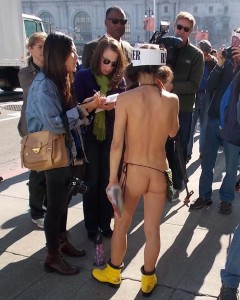 In a city where the news media has featured saturation coverage of the Supebowl football game which will pit a team from San Francisco against a team from Baltimore, the arrests drew a large contingent of journalists from a vast assortment of sources that feature news stories.
In a city where the news media has featured saturation coverage of the Supebowl football game which will pit a team from San Francisco against a team from Baltimore, the arrests drew a large contingent of journalists from a vast assortment of sources that feature news stories. The Chronicle story plugged protester Gypsy Taub’s TV show, “My Naked Truth,” and her book, “Free Your Body, Free Your Mind,” which is available in the Kindle format.
The Chronicle story plugged protester Gypsy Taub’s TV show, “My Naked Truth,” and her book, “Free Your Body, Free Your Mind,” which is available in the Kindle format.

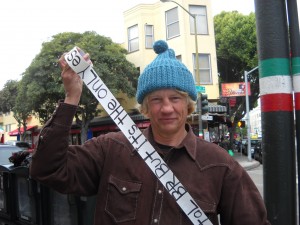






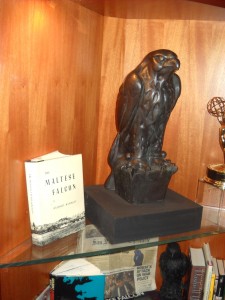


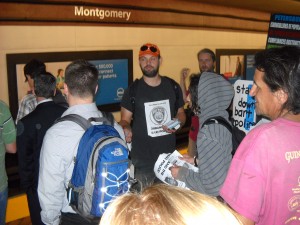
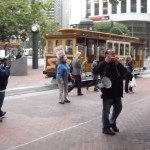


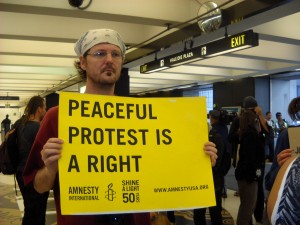
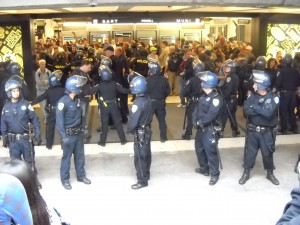


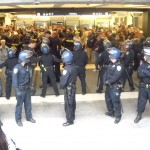


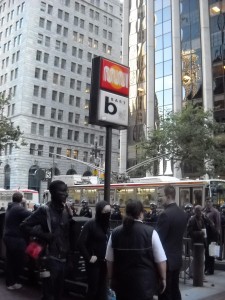

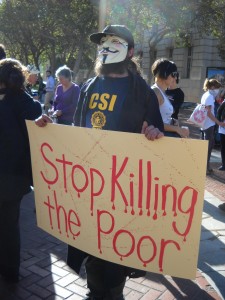

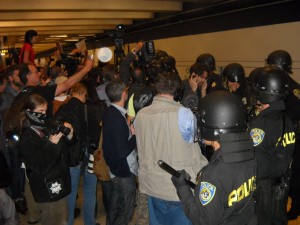
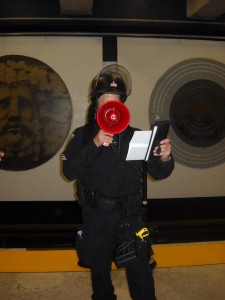
Ernie Pyle or Herb Caen?
San Francisco named a street for a famous local columnist
[Note: The annual task of writing something to be posted honoring National Columnists’ Day on April 18, which was the day that war correspondent/columnist Ernie Pyle was killed in action on the island of Ie Shima in the Pacific Theater of WWII, is always a challenge because the intention is to keep the tone lighthearted and upbeat but this year, because it falls at a time when the national mood is very somber, we will, after a moment of silence, proceed with this year’s installment, for the same reasons that Boston will hold their marathon again next year.]
A hint of scandal for this year’s America’s Cup Races in the San Francisco Bay area will provide us with a chance to examine how two of our favorite columnists might take different approaches displaying their unique styles to the task of informing their readers of the looming potential for an economic blunder with dire implications for the taxpayers in the town Herb Caen dubbed “Baghdad by the Bay.”
While preparing to write this year’s installment of our annual National Columnists Day posting to mark the day which honors both war correspondent Ernie Pyle and the vocation of being a columnist, we decided to focus this year’s effort on legendary San Francisco scribe Herb Caen who served in the Army Air Force during WWII.
Pyle wrote from the point of view of the G. I. in the foxhole, while Caen, in his civilian phase, preferred to let his audience participate vicariously in his life as a flâneur, a boulevardier, and a bon vivant, who hung out with and traded gossip with “the swells.” Caen’s first effort was published on July 5, 1938, and ended with his last column in 1997.
Obviously if both of them were still alive and churning out words, they would both take very different approaches to the growing grumbling about the Americas’ Cup races scheduled to be held later this year on San Francisco Bay.
The race’s lawyers seem to have outwitted the ones working for the San Francisco Board of Supervisors and so the two parties signed a deal that, upon closer reading, will leave the citizens liable for a large financial shortfall.
We assume that Caen would look forward to rubbing elbows with the “swells” who will conduct the races and hold the accompanying “invitation only” parties and maybe he would also describe the spectacle as seen from a private airplane flying overhead. Isn’t it logical to conclude that Pyle would side with the taxpayers who can only use binoculars to see some (three?) sailboats on the bay?
Caen’s pioneering approach to celebrity journalism made him a star in the ranks of columnists. He coined the word “beatnik” and quite often his witty way with words won him a mention in the monthly “towards more picturesque speech” feature in the Readers’ Digest.
Caen was a staunch supporter of iconoclastic wit and provided a continuing source of publicity to Lenny Bruce for his pioneering efforts in the realm of “sick” humor.
In addition to honoring and remembering Ernie Pyle each year, the day is also intended to draw attention to the career of being a columnist, which in the Facebook era should make Pyle the Patron Saint of Facebook, since the mission statement for a columnist is essentially the same motivation for churning out the keystrokes for a Facebook page, i.e. tell the world what you are doing and thinking. Ernie Pyle, Herb Caen, and Bill Mauldin all have a Facebook page.
Can a Facebook blurb make or break a restaurant? Once, many moons ago, Caen wrote a blind item blurb about a restaurant that incurred his wrath. After it was published, the owner of another restaurant that fit the vague description of the offending culprit, contacted Caen’s office and begged him to explain that their restaurant, which had suffered a consequent crippling of their usual business level, was not the one that folks should boycott. He immediately cleared up the misperception. Can a Facebook writer have that big of an impact on a community?
The fact that Caen’s style of quick verbal jabs was dubbed “thee dot journalism,” because he used the punctuation of three dots (called an ellipse) to separate items, preceded the Internet phenomenon of catering to an audience with an attention span that demanded items with the complexity level of a bumper sticker and that should endear him to the new generation that operates with a self imposed 130 word limit. For example, isn’t just the fact that Anthony Grafton wrote a scholarly book, title “The Footnote a Curious History,” enough information for a great Herb Caen-ish column item?
A fellow who went AWAL from a military hospital, three weeks after the liberation, and went into Paris with a nurse who spoke French told us about going into a fine restaurant and ordering a “once in a lifetime” meal. When the fellow asked for the bill, management considered it a matter of honor to refuse to let the sergeant pay for the meal. We like to think that Ernie Pyle, if he heard about it, would have devoted a full column to that incident. He would (we assume) have compared and contrasted the best that Paris had to offer with the famed K-ration that the GI’s often disparaged with very salty language. (If the disk jockey is alert he will play “Moose Turd Pie” as part of the “outro” music at the end of this column.) Herb Caen, who served in WWII, was a gourmet who savored fine meals and shared his enthusiasm with his readers.
Many Facebook entries include a snapshot of a meal. Would young folks appreciate the subtlety if an Ernie Pyle wannabe posted a photo of a K-ration being served?
Once, according to an anecdote provided by one of Caen’s contemporary rivals in the realm of column writing, the two competitors for the right to the title of “Mr. San Francisco,” were out cavorting in some fog city bars after WWII. They became a bit rowdy and a rookie policeman started to arrest them. They simultaneously asked if the youngster knew who he was trying to arrest. He didn’t know and didn’t care. He led them down to the local station. When the trio entered, the desk sergeant began to laugh boisterously and asked the newcomer: “Do you know who you are trying to arrest?” Case dismissed!
The San Francisco Chronicle would, when Caen was on vacation, run a box on the front page above the fold saying “Herb Caen is on vacation” to cut down on the number of complaints from people who would call and bitch about not being able to find that day’s installment of the column simply titled “Herb Caen.”
Once, back in the season when the Oakland Raiders won games when George Blanda would kick a last second field goal, a reporter for the Tahoe Daily Tribune rushing a “starter” copy of the day’s publication, noticed that at the beginning of the lead story, the words indicated that the story was about the will a local celebrity had written “after” he died. The ME had a “Stop the presses!” moment and the word was quickly changed to “after” and one of the typesetters was given a stern lecture about the rule that only editors could change copy. The incident was quickly forgotten until the next week when the secret goof-up was prominently mentioned in Herb Caen’s column.
According to Barnaby Conrad, in his book “The World of Herb Caen,” the Frisco phenomenon produced enough columns of approximately 1,000 words (about three takes) that Caen’s lifetime total would verify this boast: “If laid end to end, his columns would stretch 5.6 miles from the Ferry Building to the Golden Gate Bridge.”
At the height of his popularity Ernie Pyle was read by approximately 3 million readers nationwide.
Facebook posters might note with extreme envy that in his prime, Caen received 45,000 letters a year. Isn’t a fan letter better than a quick “like” click?
Herb Caen wrote: “If I do go to heaven, I’m going to do what every San Franciscan does who goes to heaven. He looks around and says, It ain’t bad, but it ain’t San Francisco.”
Now the disk jockey will play the “Vertigo” soundtrack album, the “Moby Grape” album, and the Jefferson Airplane’s “Surrealist Pillow” album. We have to go reread Ernie Pyle’s very gruesome and lugubrious columns written on the Normandy Beach (as foud in the Random House book “Ernie’s War: the Best of Ernie Pyle’s World War II Dispatches” edited by David Nichols) immediately after the D-Day Invasion. Have a “soldier on” type week.